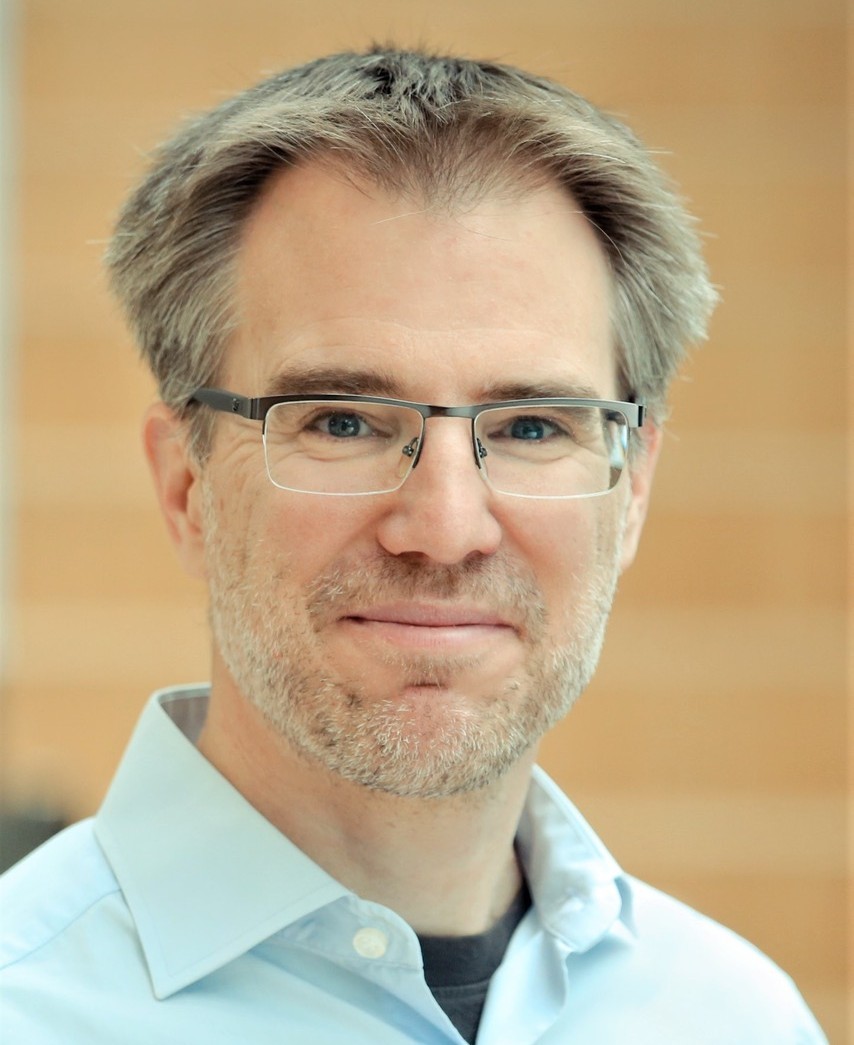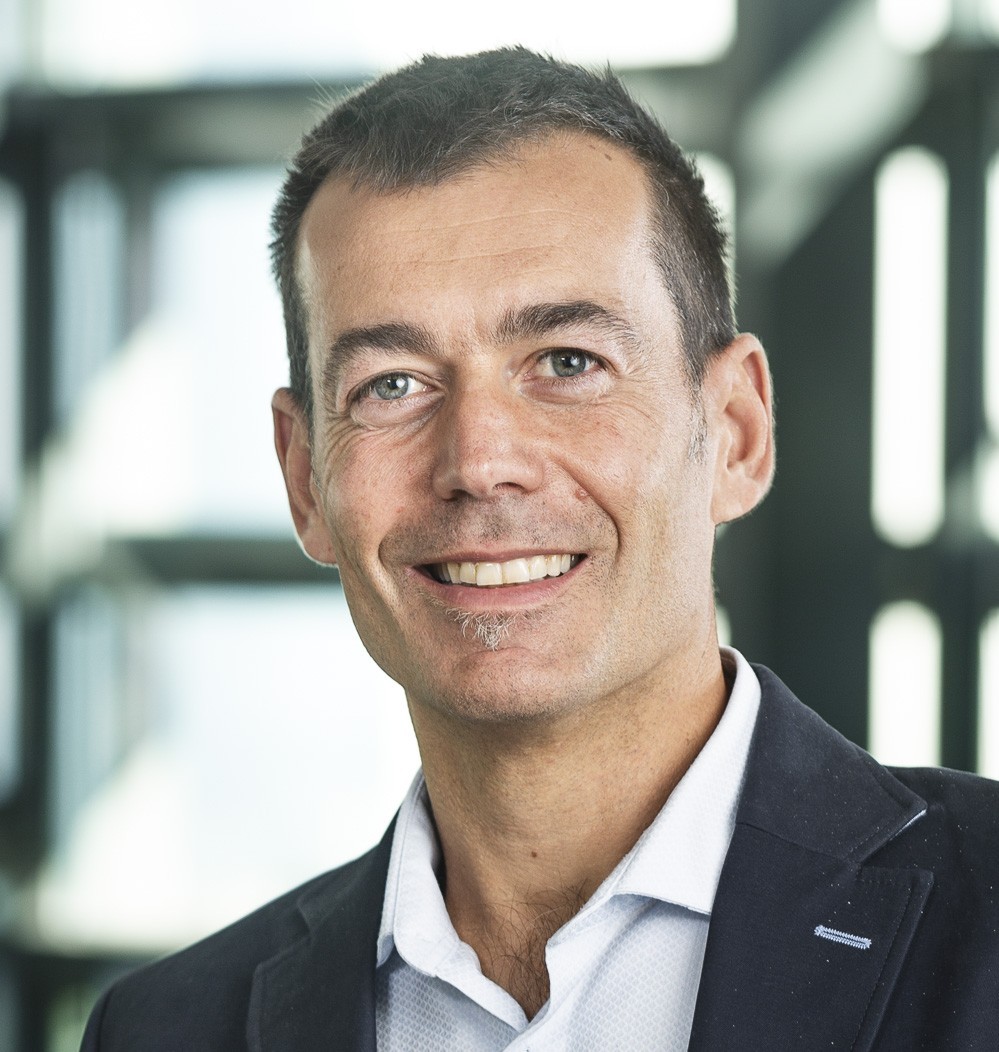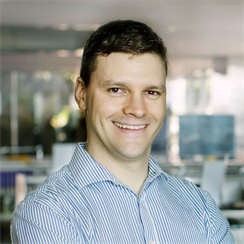Joerg Widmer
Millimeter-Wave Joint Communication and Sensing and Location-based Network Control
Abstract
The high bandwidth available at millimeter-wave frequencies allows for very high data rates, and the latest wireless technologies already exploit this part of the radio spectrum to achieve rates of several GBit/s per user. Communication at these frequencies typically uses directional antennas which brings about interesting challenges to align antenna beams. Given the high penetration loss, most obstacles (e.g., a person) also completely block the signal. This results in a very dynamic radio environment and channels may appear and disappear over very short time intervals. This keynote highlights some approaches to deal with these networking challenges. The very large bandwidth available at mm-wave frequencies also allows to design highly accurate location systems, and such location information be used to facilitate beam training, optimize access point association, and predict future blockage. We discuss how to implement such millimeter-wave location systems and present network optimization mechanisms based on simultaneous localization and mapping of the environment. Finally, the information about the wireless channel of millimeter-wave systems can also be used for highly accurate environment sensing. We discuss how to use communication hardware to perform zero-cost monitoring of human movement and activities in indoor spaces (rather than using dedicated radars). We show that access points can be retrofitted to perform radar-like extraction of the micro-Doppler effects caused by the motion of multiple human subjects. We then use this to achieve fine-grained sensing applications such as simultaneous activity recognition and person identification. In this keynote, we will specifically focus on the practical implementation aspects, testbed design and experimental results with such systems.About the speaker
 Joerg Widmer is Research Professor and Research Director of IMDEA Networks in Madrid, Spain. Before, he held positions at DOCOMO Euro-Labs in Munich, Germany and EPFL, Switzerland. He was a visiting researcher at the International Computer Science Institute in Berkeley, USA, University College London, UK, and TU Darmstadt, Germany. His research focuses on wireless networks, ranging from extremely high frequency millimeter-wave communication and MAC layer design to mobile network architectures. Joerg Widmer authored more than 200 conference and journal papers and three IETF RFCs, and holds 14 patents. He was awarded an ERC consolidator grant, the Friedrich Wilhelm Bessel Research Award of the Alexander von Humboldt Foundation, a Mercator Fellowship of the German Research Foundation, a Spanish Ramon y Cajal grant, as well as nine best paper awards. He is an IEEE Fellow and Distinguished Member of the ACM.
Joerg Widmer is Research Professor and Research Director of IMDEA Networks in Madrid, Spain. Before, he held positions at DOCOMO Euro-Labs in Munich, Germany and EPFL, Switzerland. He was a visiting researcher at the International Computer Science Institute in Berkeley, USA, University College London, UK, and TU Darmstadt, Germany. His research focuses on wireless networks, ranging from extremely high frequency millimeter-wave communication and MAC layer design to mobile network architectures. Joerg Widmer authored more than 200 conference and journal papers and three IETF RFCs, and holds 14 patents. He was awarded an ERC consolidator grant, the Friedrich Wilhelm Bessel Research Award of the Alexander von Humboldt Foundation, a Mercator Fellowship of the German Research Foundation, a Spanish Ramon y Cajal grant, as well as nine best paper awards. He is an IEEE Fellow and Distinguished Member of the ACM.
Emilio Calvanese Strinati
6G Networks: Beyond Shannon Towards Semantic and Goal-Oriented Communications
Abstract
This talk promotes the idea that including semantic and goal-oriented aspects in future 6G networks can produce a significant leap forward in terms of system effectiveness and sustainability. Semantic communication goes beyond the common Shannon paradigm of guaranteeing the correct reception of each single transmitted packet, irrespective of the meaning conveyed by the packet. The idea is that, whenever communication occurs to convey meaning or to accomplish a goal, what really matters is the impact that the correct reception/interpretation of a packet is going to have on the goal accomplishment. Focusing on semantic and goal-oriented aspects and possibly combining them, helps to identify the relevant information, i.e. the information strictly necessary to recover the meaning intended by the transmitter or to accomplish a goal. With this talk, we focus on the benefit of semantic compression. We present and detail a novel architecture that enables representation learning of semantic symbols for effective semantic communications. After discussing theoretical aspects and successfully design objective functions, which help learn effective semantic encoders and decoders, we present promising experimentation results for the scenario of text transmission when the sender and receiver speak different languages.About the speaker
 Dr. Emilio Calvanese Strinati obtained his Engineering Master degree in 2001 from the University of Rome ''La Sapienza'' and his Ph.D in Engineering Science in 2005 from Paris Telecom. He then started working at Motorola Labs in Paris in 2002. Then in 2006 he joint CEA LETI as a research engineer. From 2007, he becomes a PhD supervisor. From 2010 to 2012, he has been the co-chair of the wireless working group in GreenTouch Initiative, which deals with design of future energy efficient communication networks. From 2011 to 2016 he was the Smart Devices & Telecommunications strategic programs Director, then, until January 2020 he was the Smart Devices & Telecommunications Scientific and Innovation Director. Since February 2020 he is the Nanotechnologies and Wireless for 6G (New-6G) Program Director focusing on future 6G technologies. He has published around 200 papers in journals, international conferences, and books chapters, and he has given more than 200 international invited talks, keynotes and tutorials. He is the main inventor of more than 75 patents. His current research interests are on Reconfigurable Intelligent Surfaces, Semantic communications, Goal-oriented communications AI-native technologies in the contest of 6G.
Dr. Emilio Calvanese Strinati obtained his Engineering Master degree in 2001 from the University of Rome ''La Sapienza'' and his Ph.D in Engineering Science in 2005 from Paris Telecom. He then started working at Motorola Labs in Paris in 2002. Then in 2006 he joint CEA LETI as a research engineer. From 2007, he becomes a PhD supervisor. From 2010 to 2012, he has been the co-chair of the wireless working group in GreenTouch Initiative, which deals with design of future energy efficient communication networks. From 2011 to 2016 he was the Smart Devices & Telecommunications strategic programs Director, then, until January 2020 he was the Smart Devices & Telecommunications Scientific and Innovation Director. Since February 2020 he is the Nanotechnologies and Wireless for 6G (New-6G) Program Director focusing on future 6G technologies. He has published around 200 papers in journals, international conferences, and books chapters, and he has given more than 200 international invited talks, keynotes and tutorials. He is the main inventor of more than 75 patents. His current research interests are on Reconfigurable Intelligent Surfaces, Semantic communications, Goal-oriented communications AI-native technologies in the contest of 6G.
Marco Canini
Scaling Deep Learning and Datacenter Applications with Programmable Networks
Abstract
A wide range of datacenter workloads, including distributed deep learning and key-value storage systems, continue to push the boundaries of efficient system design with low-latency and intensive communication requirements. We propose to address these challenges by extending the reach of application logic into network behavior tailored to meet such requirements. This talk reviews our recent research efforts in pursuit of this objective. Thanks to inroads in programmable networks, we design new in-network capabilities such as in-network aggregation and flexible RDMA offloads that directly accelerate workloads without burdening end users.About the speaker
 Marco does not know what the next big thing will be. But he’s sure that our next-gen computing and networking infrastructure must be a viable platform for it. Marco’s research spans a number of areas in computer systems, including distributed systems, large-scale/cloud computing and computer networking with emphasis on programmable networks. His current focus is on designing better systems support for AI/ML and providing practical implementations deployable in the real-world. Marco is an associate professor in Computer Science at KAUST. Marco obtained his Ph.D. in computer science and engineering from the University of Genoa in 2009 after spending the last year as a visiting student at the University of Cambridge. He was a postdoctoral researcher at EPFL and a senior research scientist at Deutsche Telekom Innovation Labs & TU Berlin. Before joining KAUST, he was an assistant professor at UCLouvain. He also held positions at Intel, Microsoft and Google.
Marco does not know what the next big thing will be. But he’s sure that our next-gen computing and networking infrastructure must be a viable platform for it. Marco’s research spans a number of areas in computer systems, including distributed systems, large-scale/cloud computing and computer networking with emphasis on programmable networks. His current focus is on designing better systems support for AI/ML and providing practical implementations deployable in the real-world. Marco is an associate professor in Computer Science at KAUST. Marco obtained his Ph.D. in computer science and engineering from the University of Genoa in 2009 after spending the last year as a visiting student at the University of Cambridge. He was a postdoctoral researcher at EPFL and a senior research scientist at Deutsche Telekom Innovation Labs & TU Berlin. Before joining KAUST, he was an assistant professor at UCLouvain. He also held positions at Intel, Microsoft and Google.